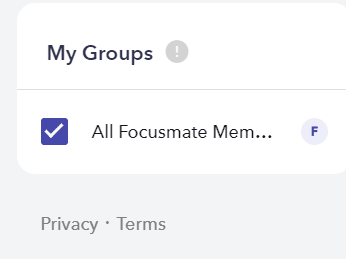Abstract
Do you wish you could increase your productivity while socializing with other effective altruists? Are you tired of browsing social media instead of getting your project done or engaging in meaningful interaction? Would you like to meet new people who can be friends or collaborators?
For this purpose, we created an EA community group on FocusMate:
https://www.focusmate.com/signup/EffectiveAltruism
Focusmate is a platform that is centered around one on one video calls for accountability regarding focused work. Therefore it both can help you improve your productivity and fosters exchange and value-creation in the EA Community. The latter can be both understood as something you want to have or to give to others.
Focusmate has transformed my productivity over the past few months. It applies many things we know from psychology about getting things done in one platform. And I consider it a valuable idea to combine its group feature with the EA community!
What is FocusMate?
It is a platform where you can select 50 minutes working sessions and get randomly matched with your "focus mate" from somewhere on the globe. You then check in with one another via video call, tell each other your intentions for the 50 minutes, and start working while seeing one another. After a gong in the end you reflect how it went, thank one another for working together and leave the chat again.
It does multiple things well:
- you have a social commitment to another person to show up to your work session (you also have an attendance rate shown in your profile and one-on-ones increase the responsibility a lot in comparison to a study group where you can assume someone else will be there anyway)
- you formulate a concrete task to work on and have to think about your intentions
- you have social contact (you can learn a bit about the other person from time to time and learn what others work on)
- you reflect on your progress in the end, which also helps to calibrate the amount of time that is realistic for a task ("do you always over or underachieve on your intentions?")
- and you express gratitude for the other person being your focus mate in the end expressing gratitude is one of the most powerful happiness behaviors)
The founders also launched the function "FocusMate groups" that members can join (upon invitation) to then get primarily matched with other people from that group.
Vision
I think it would be very valuable, partly by being simply enjoyable, to work via video chat with random other effective altruists.
My experience was that in study groups I saw other people for weeks or months, but never had a 1:1 conversation with them and sometimes didn’t even learn their name.
I remember how I felt so lonely in my first two years as an EA, far away from the big hubs some years ago. I felt like I didn’t fully belong, because of that, as I saw the geographical hubs do things together and me not even interacting with them virtually.
Some of these issues could have been fixed by FocusMate and an EA group on it.
You always also get to know one another a bit, get work done, feel connected, can probably coordinate better, and much more.
You can frame being on there both as getting something from the community, but also as providing something to it, by making others productive and feel like they belong.
The EA community group
After requesting to create an Effective Altruism Group it turned out another EA was faster than me and a group with around 90 people already existed.
We are now working on making it common knowledge that this group exists. Please help spread the word by sharing this article.
The group has been founded and is administered by Dony Christie, who also crowdfunded the first months of funds needed. Thank you very much Dony!
CEA will cover the costs for an additional three months, while we test how the community uses the service. We are still in the process of defining what “testing” means. We are relatively certain that number of people who join and use the service is an obvious metric, so, well, join and use the service and give us qualitative feedback (comment) how you like it.
Join via this link:
https://www.focusmate.com/signup/EffectiveAltruism
Please share the link and this post with other effective altruists.
It will be an ongoing process to spreading it while also protecting it from people who shouldn’t be in it. At this point in time, the first point is more important.
Best Practices
On Focusmate, some guidelines to follow are:
- Show up on time
- Be friendly and encouraging
- Ask what the other person will work on, and define your task(s)
- Asking whether or not to mute during the session
- Working focused during the session and checking in whether your FocusMate also does so
- Check-in with one another after the gong to reflect about the session
- EA bonus: If you have time, interacting with your FocusMate. You could ask classical questions like what cause areas they are excited about, where in their “impact journey” they currently are, provide relevant information or just have some fun interaction.
Looking forward to see you via video chat and working together soon!
Anna
PS: After 6 years of being very active in the movement this is my first EA Forum post. Thanks to Aaron Gertler for the nudge to do so.




It now handles 75 min and also 25min. There have been a bunch of other updates that generally make it easier to use, including a built-in picture-in-picture so that a little video window stays on top, as you're working and you don't have to have the focusmate window on top at all